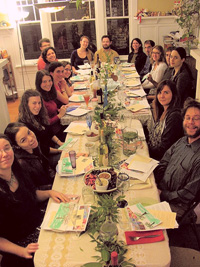By Debs Gardner, Special to JTNews
The Ravenna Kibbutz, the Jewish intentional community formed in 2007 in Seattle’s Ravenna neighborhood, closed its doors October 1 when the kibbutz’s landlord decided to sell the house. And so, five years of Shabbat dinners and events come to an end.
The Ravenna Kibbutz has always been a place of change, despite the sense of some residents and guests that it has always been one way or another. It started with one house (the one being sold now) in 2007 and grew to three houses, increasing and decreasing in size as residents moved in and out, lives changed, and houses changed hands. The events the kibbutz offered varied.
But there’s been one consistent theme: Friends and friends-to-be coming through and experiencing Jewish or Jew-ish community in a casual home setting. Shabbat dinner for mostly young, mostly Jews has, for years now, meant sitting around a familiar home dining room table with friends and strangers and, before making Kiddush, thanking “God — and the unions! — for the weekend.” Shabbat dinners were like going over to your friend’s house because, well, that’s what they’ve been.
The goal is to continue that, now that we’ve had five years to practice. We’re launching an informal group called the Seattle Shabbat Potluck Co-op.
The concept is pretty simple. Anyone can host a Shabbat dinner or other event any time, and invite a limited or large number of people. They can host in the style of the kibbutz or in their own style. If needed, UW Hillel is kindly holding a few tables, folding chairs, and other supplies from the kibbutz for use. It’s basically a rotating Shabbat dinner, and still a chance to meet new people and see old friends.
As a resident of the Ravenna Kibbutz for the last two-plus years, and a frequent visitor before that, I admit the change is hard. The place grew into a community, the kind that even those who only visited a few times a year saw as integral to Seattle Jewish life. It was a place to run into beloved friends and meet new people without the stress of being in a more public or formal setting. It was unaffiliated with any branch of Judaism or level of religiosity, welcoming in guests ranging from Modern Orthodox to agnostic to friends and partners of Jews. It was also wildly silly, irreverent, and wonderfully weird.
At the final Shabbat dinner, we recounted stories and memories of the kibbutz. Neal Schindler told the story of the time the kibbutz acquired a “quadricycle,” a vehicle built out of a long rectangular platform, bicycle wheels, and boat seats, and members pedaled it around the neighborhood, nearly crashing, until a tavern owner came out and offered to buy us all drinks.
Danielle Soffer told of a kibbutz that welcomed her in warmly the first time she visited, and how quickly she moved in after that. Lonnie Wall recounted how Azura Newman’s introduction of him as “granddad” led that nickname to stick. Elias Kass remembered the five-minute lecture series we organized one year for Shavuot, during which we learned about topics ranging from punctuation to what babies can do when they’re born.
We recalled various Sukkot celebrations, from the time the spare sukkah collapsed to the time we did the blessings in the pouring rain, to the years the sukkah came out perfectly, decorated with lace and vines and fruits and bamboo. We might have told a few last “that’s what she said” jokes for old time’s sake.
We closed up the house as Sukkot was starting, with no longer any time or reason to build a sukkah. Matching the holiday’s theme, we realized we were entering a time of transition and temporary dwellings, looking forward to Shabbat dinners and other festivities under any roof.
We’ll miss the house itself, with its fruit trees, enormous backyard, porches, and Craftsman details, just as we missed a previous house when it closed. But there will be a certain delight in getting to visit new places, see one another’s homes, and realize that the same people (and their new friends — the new co-op is open to anyone participating and hosting) can make the same kind of community, Kiddush, and terrible jokes in any house or apartment big enough for a dinner table and two challot.
Ideally, the informal co-op will thrive and be a model for other communities where Jews seek semi-structured home-based events. The Ravenna Kibbutz was great practice. With the start of a new year and a reflection on the year gone by, we look forward to sweet new beginnings.
For more information about
the Seattle Shabbat Potluck Co-op, visit www.facebook.com/groups/seattleshabbatpotluckcoop.
Deborah (Debs) Gardner was a resident-organizer of the Ravenna Kibbutz from 2010 to 2012. She is a writer focusing on food and public health.
